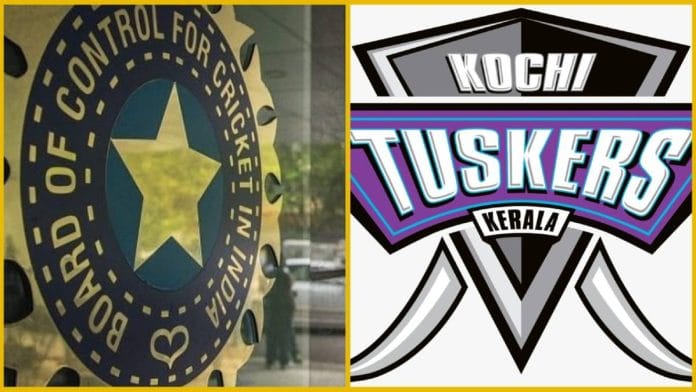New Delhi: The Bombay High Court Tuesday upheld an arbitral award of over Rs 538 crore to Kochi Cricket Private Limited (KCPL) and Rendezvous Sports World (RSW), owners of the now defunct Indian Premier League (IPL) franchise Kochi Tuskers Kerala.
The bench of Justice Riyaz Iqbal Chagla directed the Board of Control for Cricket in India (BCCI), the governing body for cricket, to pay the sum to the companies, as directed by an arbitral tribunal in June 2015.
In its 107-page ruling, the court essentially upheld two awards (decisions) passed in favour of the companies by the tribunal. It had ordered payment of Rs 153.34 crore to RSW and Rs 384.83 crore to KCPL, making the total amount to be paid by the BCCI as Rs 538.17 crore.
“The jurisdiction of this Court under Section 34 of the Arbitration Act is very limited. BCCI’s endeavour to delve into the merits of the dispute, is in teeth of the scope of the grounds contained in Section 34 of the Act. BCCI’s dissatisfaction as to the findings rendered in respect of the evidence and/or the merits cannot be a ground to assail the Award,” the court said, while dismissing BCCI’s challenge to the two orders.
Also Read: IPL 2025: A season of redemption for some, reckoning for others
Case before the high court
By way of its plea, the BCCI had moved the Bombay High Court against the two arbitral awards passed in favour of Kochi Tuskers Kerala’s parent companies, under Section 34 of the Arbitration and Conciliation Act, 1996.
Section 34 allows parties to challenge an arbitral award in court, and to seek its setting aside, on grounds like the “party was under some incapacity”, or the arbitration award was invalid in law, or that the parties weren’t given proper notice for the appointment of the arbitrator, among others.
The dispute stemmed from two agreements entered into between the team’s parent companies and the BCCI, between 2010 and 2011, relating to the franchise. The Kochi team, however, could play only one season of the IPL, in 2011, where it finished eighth among the 10 teams that had played then.
On 19 September, 2011, the BCCI terminated the agreements with both companies of the Kochi Tuskers Kerala franchise, citing their failure to deliver the requisite bank guarantee before the stipulated deadline.
A bank guarantee is an undertaking that assures the beneficiary that the bank will pay the specified amount, in case the applicant defaults in delivering the financial or performance obligation, which has been stated in the guarantee. Significantly, in such a scenario, the obligation to pay is on the bank, and not the applicant, since the bank is acting as guarantor.
In its case before the HC, the KCPL had argued that there were many unresolved issues between it and the BCCI, including certain social media posts of then chairman of IPL governing council, Lalit Modi, the BCCI’s failure to provide a stadium at Kochi or an appropriate “alternative”, and one-sided reduction in the number of matches.
The Kochi franchise owners also contended in their plea that the breach of agreement by the BCCI, citing default of the bank guarantee, was wrongful and malafide, and the cricket governing body had earlier waived off this requirement itself.
What the court ruled
Rejecting the BCCI’s plea, the court said the jurisdiction of the court under Section 34 of the Arbitration Act was very limited.
The court said the BCCI was trying to make the court enter into “a fact-finding exercise” by revisiting the record and accepting competing interpretations of the various clauses of the agreements between the parties, on the grounds of perversity.
“Perversity” refers to a ground for setting aside an arbitral award. It implies that the arbitral tribunal’s decision is irrational or unreasonable, and thus, liable to be set aside.
The Supreme Court has, in “umpteen number of judgments”, like the 2019 ruling in Dyna Technologies Private Limited vs Crompton Greaves Limited, categorically held that courts should not interfere with an arbitral award simply because an alternative view on facts and interpretation exists.
The top court also said that “courts need to be cautious and should defer to the view taken by the Arbitral Tribunal even if the reasoning provided in the award is implied unless such award portrays perversity unpardonable under Section 34 of the Arbitration Act”.
The court made clear that the BCCI’s dissatisfaction with the findings given by the tribunal on the merits of the dispute could not be a ground to challenge the award.
In its 2015 decision, the tribunal had said the BCCI had wrongfully invoked the bank guarantee, and this amounted to a repudiatory breach of agreement. Thus, the high court now ruled that no interference was required with this order.
(Edited by Nida Fatima Siddiqui)
Also Read: A batting blitz, ‘notebook’ & chaos. When Rathi-Abhishek on-field antics became IPL’s talking point






